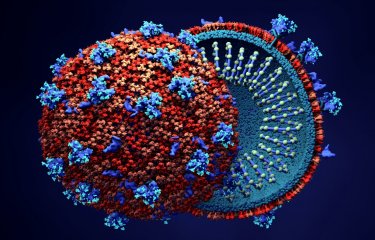Researchers and doctors from the AP-HP, the Institut Pasteur, the University of Paris and the Sorbonne University, have carried out work on the effect of immune checkpoint inhibitors (anti-PD1 and anti-CTLA4) on cellular immunity against SARS-CoV-2. This work, the results of which suggest that these treatments are not deleterious during infection with COVID-19 and, on the contrary, seem to improve the antiviral cellular immune response, were the subject of a publication on August 18, 2021 in within the journal Science Advances .
Since the end of 2019, the COVID-19 pandemic has spread around the world, causing more than four million deaths. Despite intensive research allowing major advances in the understanding of SARS-CoV-2 infection, the role of inflammation and humoral immunity (involving B cells and antibodies), the contribution of Cellular immunity mediated by CD4 + and CD8 + T lymphocytes and immune checkpoints remains poorly understood.
In order to assess the role of immune checkpoints during SARS-CoV-2 infection, the teams set up clinical and biological monitoring of a cohort of 292 patients with melanoma, half of whom were treated with immunotherapy. (anti-PD1 and / or anti-CTLA4)) during the first wave of COVID-19. They then identified 15 patients with COVID-19, during the acute or convalescent phase, making it possible to assess the clinical severity of the infection in these patients, the analysis of innate immune responses (inflammation, interferon) and adaptive immune responses. (humoral and cellular) using complementary approaches such as transcriptomics, proteomics and mass cytometry.
The analyzes showed that treatment with anti-cancer immunotherapies was not associated with a severe form of COVID-19; did not alter innate immunity or anti-SARS-COV-2 antibody production. On the contrary, there was an expansion of CD8 + effector memory T cells, increased activation of T cells and a better specific anti-SARS-CoV-2 T response.
These results suggest that anti-cancer immunotherapy is not deleterious in COVID-19. On the contrary, it seems to improve the antiviral cellular immune response. This study is therefore in favor of a broader evaluation of the clinical and biological consequences of checkpoint inhibitors during SARS-CoV-2 infection, with possibly an impact on the management of patients likely to be affected. severe forms and on the vaccination strategy of patients who do not respond to vaccination.
Source:
Immune checkpoint inhibitors increase T cell immunity during SARS-CoV-2 infection, Science Advances, August 18, 2021
Nader Yatim, Jeremy Boussier, Pauline Tetu, Nikaia Smith, Timothée Bruel, Bruno Charbit, Laura Barnabei, Aurélien Corneau, Laetitia Da Meda, Clara Allayous, Barouyr Baroudjian, Majdi Jebali, Florian Herms, Ludivine Grzelak, Isabelle Staropoli, Vincent Calmette, Jerome Hadjadj, Olivier Peyrony, Charles Cassius, Jerome Le Goff, Nora Kramkime, Selim Aractingi, Magnus Fontes, Catherine Blanc, Frederic Rieux-Laucat, Olivier Schwartz, Benjamin Terrier, Darragh Duffy and Celeste Lebbé.
DOI : 10.1126/sciadv.abg4081





